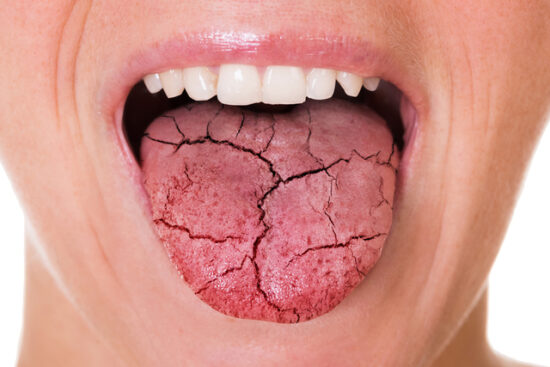
Dry mouth, formally known as xerostomia, is a common problem experienced by patients of all ages but is often ignored, since most of us assume it is not a big deal or worth seeking treating for. The condition can cause discomfort and bad breath and, if it is left untreated, can lead to serious oral health issues.
If you are experiencing a dry mouth and seeking treatment, please contact our dentist in Millwoods today. They will be happy to help you.
Dry Mouth: What is It?
Dry mouth occurs when there is a lack of saliva in your mouth. Experiencing dry mouth from time to time is normal, but when it persists, further problems can manifest and negatively impact your smile and overall health.
Patients with chronic dry mouth can have a lot of trouble chewing and swallowing. Salvia continually washes acid, bacteria, plaque, and other debris from your teeth and gums. It also contains many essential minerals like phosphate and calcium, which keep your bones strong. Thirdly, it helps you consume food smoothly. Being unable to do so can interfere with your body’s ability to digest your meals and snacks.
This condition is not exclusive to older patients, though older individuals are at a higher risk of dealing with dry mouth because they are more likely to take medications that interact with their salivary glands.
What Causes Dry Mouth?
A few different factors can contribute to the development of dry mouth, including:
- Specific medications – Dozens of medicines interact with your salivary glands and disrupt their ability to produce a proper amount of fluid. Some common examples include medications prescribed for depression and high blood pressure.
- Other diseases – Diabetes, stroke, and HIV/AIDS are some conditions that can lead to dry mouth. Cancer is also a notorious culprit. Radiation and chemotherapy are two treatments that are very hard on the body overall, and these types of drugs can harm your glands. Lastly, sleep disorders can give rise to dry mouth, namely when you sleep with your mouth open because of blocked airways.
- Damage to the nerves – When we experience damage to our nerves, mainly those nerves that are involved in communicating with our salivary glands, which are found in our head or neck, this can inhibit the creation of saliva.
Symptoms of Dry Mouth
Here are a few common symptoms that indicate you may be affected by dry mouth:
- Bad breath (halitosis)
- Mouth infection
- A sore throat
- Your mouth feels sticky
- Difficulty chewing, swallowing, and detecting taste in food
- Trouble speaking clearly
- Your throat feels dry, itchy, or like it’s burning
- Cracked lips
- Your tongue feels rough
If any of these things arise or have already manifested, do not hesitate to talk to a dentist near you. They will ask you to come in so they can perform a comprehensive dental exam and discuss your situation with you. Depending on the seriousness of your case, you may be advised to undergo a blood test with a doctor.
Treating Dry Mouth
Again, each patient’s needs will differ, which means that the most appropriate treatment will vary. Your dentist may recommend health care measures, adjusting some of your habits, or a combination of both. Maintaining a daily regime that includes brushing and flossing your teeth after meals, using mouthwash, and visiting a dentist near you for biannual checkups is very effective at boosting the health of your smile.
Additionally, here are some simple tips that can help reduce the occurrence of dry mouth at home:
Drink more water –Drinking water while you eat can help immensely when it comes to chewing and swallowing all sorts of food. It also keeps your teeth relatively clean until you can go home and brush them properly.
- Avoid caffeinated drinks – Caffeine tends to dry out the mouth very easily, so the more coffee, caffeinated tea, and certain sodas that you consume, the drier your mouth will be.
- Suck/chew on sugarless candies – Chewing on gums or sucking on candies that are citrus or mint flavored can stimulate saliva flow. Xylitol is a compound that’s found in these products; it tastes sweet just like sugar, but it isn’t damaging since it doesn’t cause cavities.
- Avoid spicy and salty foods – These types of foods can not only make your mouth drier but also lead to oral pain, as they can irritate and inflame your tissues.
- Avoid alcohol and tobacco products – In addition to contributing to liver failure or lung cancer, alcohol and tobacco can also seriously harm the health of your smile. Smoking can dry out your mouth.
If you are taking a certain medication, your dentist or doctor may talk to you about switching to a different prescription if your dry mouth is severe. Putting an air humidifier in your room at night to keep the air flowing and fresh with moisture is another good option to explore.
Come into Agape Dental Today
Looking for dry mouth treatment in Millwoods? You have come to the right place! Our team of oral health experts is dedicated to helping everyone who comes through the doors of our dental clinic. To schedule an appointment and learn more about this issue, we encourage you to call our dentist when it works for you.

